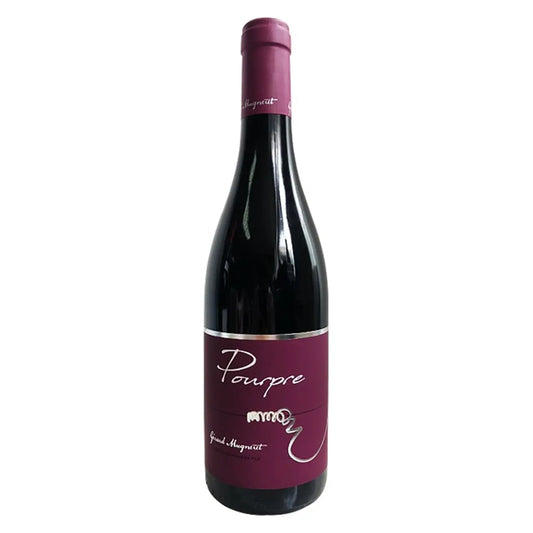Collection: Domaine Gérard Mugneret

Domaine Gérard Mugneret is located in Vosne-Romanée and is today run by Pascal Mugneret, great-grandson of the domaine's founder Gérard Mugneret.
Wines are like people, they must be accepted for who and what they are, nothing more, nothing less.
Here is what Gérard Mugneret says about Pinot Noir, the terroir, the winemaking and the wine itself.
Decisions in the vineyard and winemaking are often very personal for each producer.
I am no exception, and while I don't doubt for a moment that some may disagree with me, it is my intuition that guides me, informed by our vineyards and our domain.
First, I am particularly fond of the term vigneron because it always makes one think of the land, of the good instincts of the farmers: the policy of observation, those of our grandparents, those that we find so hard to find in our modern era.
For me, the vigneron is at the same time the best friend, the confidant, the family doctor, the protector of an unprecedented pairing: from Pinot Noir and the nourishing soil, the terroir. This interconnection is perennial, lasts decades, centuries, but is nonetheless fragile. Our predecessors came, strived to create and assigned to these two elements both strengths and weaknesses. These weaker characteristics can be inherent or ingrained in the terroir, but can also be acquired: the influence of generations of wonderful care by vignerons, year after year.
Each season, from the fall of the previous year's leaves to the harvest that year, is a new pregnancy between the pair of Pinot Noir and Terroir. If the climate is relatively mild, if the vigneron's efforts are carried out attentively and respectfully, the pregnancy will be spent in good conditions.
The management of vines is thus a skilful mix of actions (ploughing, pruning, cutting, tying the vines...) for which dates and 'doses' are very important, requiring moments of reflection to stay on track. We always seek precision to give the best support that we can to our vines ... As a father might be with his children, with their successes and their disappointments ... humility should be the greatest quality of a vigneron.
Gerard MUGNERET
Harvest time is when the newborn is finally ready to come into the world. On arrival in the cellar, the grape, the fruit of the union between Pinot Noir and Terroir, is still a multicellular being without much coherence (everything is separated: the juice, the anthocyanins, the aromatic precursors, the tannins...). Vinification, or more precisely alcoholic fermentation, is the core of the food department of viticulture, corresponding to the moment of birth. As soon as there are no remaining fermentable sugars, the wine sees the light of day, raw but already coherent, the features will quickly become finer in the following days, especially during racking (the heaviest and least noble sediments fall to the bottom of the tank).
The child then leaves the maternity ward to join its adoptive family, its caring father, the vigneron, and it is in barrels, specially chosen, that this newcomer is raised. It is the beginning of ageing: the wine's infancy. The wine will quickly assert itself and mature; the child will grow.
The next period of youth comes more or less quickly: the malolactic fermentation of the wine. We have a harder time recognizing the child we used to know, but if the adoptive father knows how to be both patient and attentive again, this rough spot will pass and the turbulent teenager will mature into a proud young adult. We will again find the traits of his original parents (Pinot Noir and Terroir), the bloodlines from previous vintages will become clear; although this young individual will be unique, he is the bearer of a story, a legacy.
The day comes when a certain balance is achieved and the wine is ready: ready to move away from the firm but fair authority of its adoptive father who gave his whole heart so that a certain harmony would inhabit the wine. The big day is bottling, when the wine matures, the day when the wine begins to live its own life.
Of course the wine will remain protected in the cellar for some time and will still be protected a little longer. But in the end, when the wine leaves, it will have a life that is more or less fulfilled, depending on the dangers it will have (storage conditions, the quality of the cork, the formation of a light deposit, etc.), but also depending on the conditions of its birth, when it was just a grape, and the values with which it was raised (the style, the winemaker's personal touch).
Not all wines are unusual, destined to cellar for years ... Just as not all people are beautiful, rich, strong and intelligent. But each one of us brings something to the table, each wine tells a story, a story that needs to be told early if the wine has had a difficult birth, and yet a story that we will repeat again and again over the years, so that its meaning will be so much more beautiful.
We should never compare wine, just as we should never compare people.
Wines are like people, they must be accepted for who and what they are, nothing more, nothing less.
-
Gérard Mugneret Pourpre VDF 2018
Regular price 415 SEKRegular priceUnit price / per

